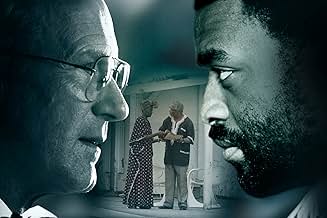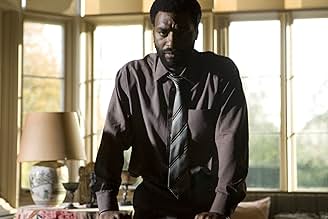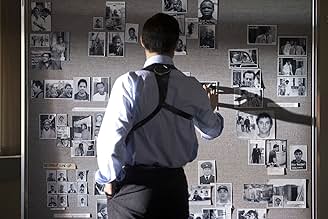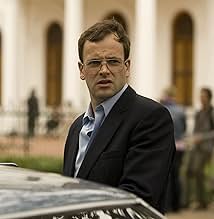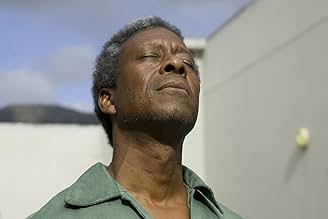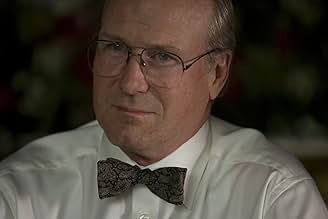VALUTAZIONE IMDb
6,2/10
2914
LA TUA VALUTAZIONE
Aggiungi una trama nella tua linguaA story based on the covert discussions that brought down the Apartheid regime in South Africa.A story based on the covert discussions that brought down the Apartheid regime in South Africa.A story based on the covert discussions that brought down the Apartheid regime in South Africa.
- Regia
- Sceneggiatura
- Star
- Candidato a 1 Primetime Emmy
- 16 candidature totali
Recensioni in evidenza
Its not a great game but a very watchable film and with South Africa somewhat topical 2009-10 (I have faith like potatoes to watch) (and Invictus in the pipeline)I enjoyed the history lesson of the film and the insight that privateers such as Michael Young helper not only the peace in south Africa but are lending a hand with Hamas as we speak and involved themselves on the Northern Ireland peace deal as well. didn't Clerk come in and steal inevitable glory from Botha and I was left wondering more about Mandelas relationship with the ANC bad guys who are in power now (the real terrorists?0 but i did enjoy the movie. it is an objective film, not over-acted, doubt if it will win any awards but don't miss it!
The end of the hated Apartheid regime in South Africa is an uplifting story, but also, as told in this drama-documentary, an oddly undramatic one. There was no revolution, nor even a commitment to reform from within. Instead, as the system became increasingly untenable on the ground in the face of growing popular unrest, a series of unofficial negotiations between prominent Afrakaaners and the opposition were eventually endorsed by F.W. de Klerk shortly after his appointment as leader of the country, in a tacit acknowledgement that he had run out of other options. Undramatic maybe, but this is still a worthy retelling of the mechanics of the process. It's surprising to see Thabo Mbeki, later much criticised as a later south African leader when he denied that H.I.V. causes A.I.D.S., portrayed here in such a positive light. William Hurt is completely convincing as an Afrikaaner, while 'Wire' veteran Clarke Peters captures the essence of Nelson Mandela with a delicate performance . There's an element of hagiography in the film's treatment of the men who negotiated, but it is justifiably an uplifting story, especially in the knowledge of how, in the main, Mandela has managed to justify his status as virtual deity since his release; and how, for all its continuing problems, South African society has not collapsed with democracy.
"Endgame," a British film that premiered on PBS' "Masterpiece Contemporary" but also played briefly in theaters in America, provides us with a behind-the-scenes glimpse into the waning days of South African Apartheid.
The time is the 1980s. While political prisoner Nelson Mandela languishes behind bars and violent uprisings rend the fabric of the nation, the white-minority Afrikaner government led by President P.W. Botha has declared the ANC (the African National Congress) to be an illegitimate terrorist organization run by communists and therefore unworthy of a seat at the table in any negotiations concerning the role of blacks in the future of South Africa. Into the breach stride a number of crucial players who are attempting – at great personal risk to themselves and their families - to bring the two opposing sides together through secretive talks being held at an estate in the English countryside. Present at that event are Michael Young (Jonny Lee Miller), a British businessman whose company has vital interests in South Africa and who sees the eventual abolishment of Apartheid as a good and necessary thing on both a professional and moral level; Thabo Mbeki (Chiwetel Ejiofor), a representative from the ANC; and Willie Esterhuyse (William Hurt), a philosophy professor who seems to see both sides of the issue and can therefore serve as an honest broker between the two factions (though the government also sees him as a potentially useful spy for its own side). Mandela (Clarke Peters) and Botha (Timothy West) also appear as characters, with the latter trying to convince the former to denounce the ANC's acts of violence, using subtle tactics of persuasion to do so.
Written by Paula Milne and directed by Pete Travis, "Endgame," which is based on the book "The Fall of Apartheid" by Robert Harvey, strikes a careful balance between conversational sit-downs, where agreements are reached and terms hashed out, and the kind of breath-bating, cloak-and-dagger espionage sequences that are a crucial part of any political thriller. The characters are all thoughtful, three-dimensional men who have strong opinions on matters but who are also open to new ideas and compromise and who often have to contend with their own fears, prejudices and self-doubts before they can finally come to a workable resolution. The movie manages to be intimate in tone while, at the same time, never neglecting the broader political and social canvas against which this small-scale drama is taking place. The result is a well-acted, informative and dramatically compelling re-creation of recent history.
And beyond its purely academic function, "Endgame" serves as an inspirational reminder that it sometimes takes just a handful of brave, morally decent and right-thinking people willing to forget their differences and to come together in a common cause to make the world a better place.
The time is the 1980s. While political prisoner Nelson Mandela languishes behind bars and violent uprisings rend the fabric of the nation, the white-minority Afrikaner government led by President P.W. Botha has declared the ANC (the African National Congress) to be an illegitimate terrorist organization run by communists and therefore unworthy of a seat at the table in any negotiations concerning the role of blacks in the future of South Africa. Into the breach stride a number of crucial players who are attempting – at great personal risk to themselves and their families - to bring the two opposing sides together through secretive talks being held at an estate in the English countryside. Present at that event are Michael Young (Jonny Lee Miller), a British businessman whose company has vital interests in South Africa and who sees the eventual abolishment of Apartheid as a good and necessary thing on both a professional and moral level; Thabo Mbeki (Chiwetel Ejiofor), a representative from the ANC; and Willie Esterhuyse (William Hurt), a philosophy professor who seems to see both sides of the issue and can therefore serve as an honest broker between the two factions (though the government also sees him as a potentially useful spy for its own side). Mandela (Clarke Peters) and Botha (Timothy West) also appear as characters, with the latter trying to convince the former to denounce the ANC's acts of violence, using subtle tactics of persuasion to do so.
Written by Paula Milne and directed by Pete Travis, "Endgame," which is based on the book "The Fall of Apartheid" by Robert Harvey, strikes a careful balance between conversational sit-downs, where agreements are reached and terms hashed out, and the kind of breath-bating, cloak-and-dagger espionage sequences that are a crucial part of any political thriller. The characters are all thoughtful, three-dimensional men who have strong opinions on matters but who are also open to new ideas and compromise and who often have to contend with their own fears, prejudices and self-doubts before they can finally come to a workable resolution. The movie manages to be intimate in tone while, at the same time, never neglecting the broader political and social canvas against which this small-scale drama is taking place. The result is a well-acted, informative and dramatically compelling re-creation of recent history.
And beyond its purely academic function, "Endgame" serves as an inspirational reminder that it sometimes takes just a handful of brave, morally decent and right-thinking people willing to forget their differences and to come together in a common cause to make the world a better place.
For what this movie signifies, it's very important and great on what it's representing, but the movie as a whole is pretty okay. It lacks the budget it needs to be great, but at the same time I give it a 7 because the two main leads save the film and are quite frankly, phenomenal.
Those two main leads being William Hurt and Chiwetel Ejiofor. They give two powerhouse performances and pretty much save the movie from being a 5 and they're chemistry is real and pure as to when the final result comes at the end, it is touching to the viewer because of how great these two performances were as well as it's touching from the historical aspect of it too. Overall a pretty good movie.
Those two main leads being William Hurt and Chiwetel Ejiofor. They give two powerhouse performances and pretty much save the movie from being a 5 and they're chemistry is real and pure as to when the final result comes at the end, it is touching to the viewer because of how great these two performances were as well as it's touching from the historical aspect of it too. Overall a pretty good movie.
It's 1985 South Africa. Public affairs director of Consolidated Goldfields Michael Young (Jonny Lee Miller) sneaks into a township looking for people to secretly negotiate with. Eighteen months later in London, he makes contact with ANC Head of Information Thabo Mbeki (Chiwetel Ejiofor). He is stalked by government agents as he tries to convince Professor Willie Esterhuyse (William Hurt) to join in the effort. Head of intelligence Dr. Neil Barnard (Mark Strong) meets Nelson Mandela (Clarke Peters) in prison. Company head Rudolph Agnew (Derek Jacobi) finances the secret meetings but will deny any knowledge of Michael's plans if discovered. In 1988 Somerset, England, the group gathers to negotiate in a palatial estate.
This is a drama of an important moment in history. The first half hour has great tension as Michael scrambles to organize this negotiation. The suspense is mostly lost once the group gathers at that mansion. The outcome is never in doubt. The actors are strong and they keep it watchable.
This is a drama of an important moment in history. The first half hour has great tension as Michael scrambles to organize this negotiation. The suspense is mostly lost once the group gathers at that mansion. The outcome is never in doubt. The actors are strong and they keep it watchable.
Lo sapevi?
- QuizWilliam Hurt and Mark Strong also appeared in Sunshine - Storia di una famiglia (1999), Syriana (2005) and Robin Hood (2010).
- BlooperAt the beginning of the movie it clearly shows that the speedometer is at 0 while driving down the road.
- Citazioni
Epilogue: When the IRA decided to negotiate a peaceful solution to the Irish conflict, they secretly turned to the ANC
[African National Congress]
Epilogue: for advise on how to do it. They are now advising Hamas on the same strategy.
- ConnessioniFeatured in The 62nd Primetime Emmy Awards (2010)
- Colonne sonoreLow Life
Performed by Scanners
Written by Sarah Daly and Matthew Mole
Courtesy of Influx Music Ltd./Dam Mak Records/Rhino Independent
By Arrangement with Warner Music Group Film & TV Licensing
I più visti
Accedi per valutare e creare un elenco di titoli salvati per ottenere consigli personalizzati
- How long is Endgame?Powered by Alexa
Dettagli
Botteghino
- Lordo Stati Uniti e Canada
- 9645 USD
- Fine settimana di apertura Stati Uniti e Canada
- 1608 USD
- 8 nov 2009
- Lordo in tutto il mondo
- 26.260 USD
- Tempo di esecuzione
- 1h 49min(109 min)
- Colore
- Mix di suoni
- Proporzioni
- 2.35 : 1
Contribuisci a questa pagina
Suggerisci una modifica o aggiungi i contenuti mancanti


